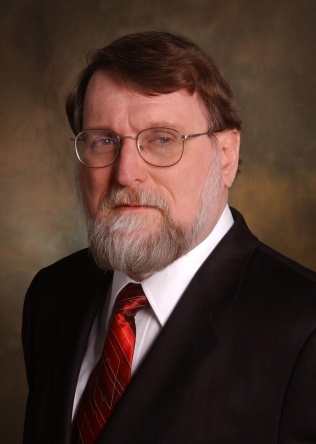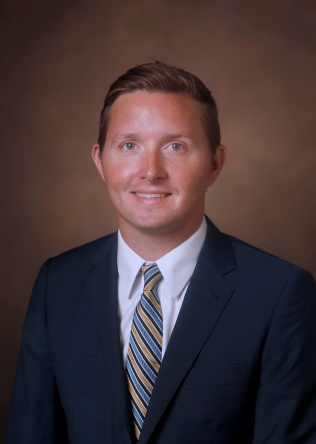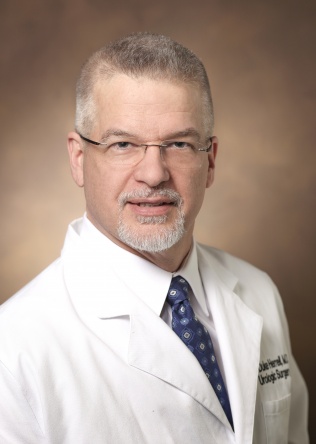J.
Personal Statement
Dr. Matusik’s laboratory has been engaged in studies of various aspects of molecular genetics and transgenic mouse models of prostate cancer. We discovered that the androgen regulated probasin promoter directs prostate-specific gene expression in the mouse, has made it possible for the research community to target transgenes to the prostate for new models of prostate cancer. Our work has shown that the NF-kappaB pathway plays a major role to induce AR full length and AR variants during prostate cancer and benign prostatic disease resulting in failure to medical therapy. Further, by studying androgen regulated promoters, we were the first to identified Forkhead BoxA1 (FOXA1) as an important AR co-regulator in the prostate and that loss of FOXA1 in bladder cancer results in a decrease of overall survival. Mutation in FOXA1 are now recognized to identify unique subset of prostate cancer patients.
Positions and Honors
Positions and Employment
1979-1996 Assistant, Associate, and Professor, Department of Physiology, University of Manitoba, Canada
1992-1993 Visiting Scientist, British Columbia Cancer Agency, Vancouver, B.C., Canada
1996-present Professor and Director, Urologic Research, Department of Urology, The Vanderbilt Prostate Cancer Center, Professor of Cancer Biology, Cell and Developmental Biology, and Vanderbilt-Ingram Cancer Center, Vanderbilt University Medical Center
2011-present William L. Bray Chair in Urology, Vanderbilt University Medical Center
Other Experience and Professional Memberships
1997-1998 NIH Program Project Site Visits
1998 NIH Biochemical Endocrinology Study Section
1998 NIH O’Brien Center Program Project Grant Review
1998 Department of Veterans Affairs, Merit Review Committee
1999 Department of Defense, Study Section
1999-2004 NIH: Biochemical Endocrinology Study Section
2001-2004 Molecular Endocrinology Editorial Board
2006-2008 Canadian Prostate Cancer Research Initiative Management Committee
2007 NIDDK Prostate Basic and Clinical Science Strategic Planning Committee
2008 Damon Runyon Fellowship Award Committee
2010 NCI P01 Special Emphasis Panel on Molecular Oncology
2011 NCI P01 Special Emphasis Panel on Therapeutic Strategies for Cancer
2014 NCI P01 Special Emphasis Panel
Honors
1966-1970 Illinois State Scholarship
1976-1977 Damon Runyon Walter Winchell Fellow
1977-1979 NIH Fellow
1980-1985 Medical Research Council Scholarship (Canadian Career Development Award)
2007 Society for Basic Urology Research (SBUR) Meritorious Achievement Award (presented 2008)
2015 American Association for the Advancement of Science Fellow (presented 2016)
Contributions to Science
1. Discovered the Prostate Specific Probasin (PB) Promoter: Our publication(s) defined a fragment of the PB promoter that targets prostate specific gene expression in transgenic animals. Our first small sPB promoter (-426/+28 bp) was prostate specific but it targeted low levels of transgene expression to the prostate. We tested a large LPB (12,000 bp) that gave high levels of transgene expression but the large size of the DNA fragment limited its utility to make constructs for transgenic animals. Based upon our characterization of the PB promoter, we designed a third construct (ARR2PB) that was under 500 bp in size, contained to two androgen regulated and prostate specific elements that would target high levels of transgene expression to the mouse prostate. We have identified the PB DNA sequences and transcription factors binding sites that regulate prostate specific gene expression (Zhang et al. The Prostate 70:934, 2010). The ARR2PB has been used to create PBCre4 as well as targeting other transgenes to the mouse prostate. Our PB constructs have been sent out to over 400 laboratories worldwide.
a. Rennie PS, Bruchovsky N, Leco KJ, Sheppard PC, McQueen SA, Cheng H, Snoek R, Hamel A, Block ME, MacDonald BS, Nickel BE, Chang C, Liao S, Cattini PA, and Matusik RJ: Characterization of two cis-acting elements involved in the androgen regulation of the probasin gene. Mol. Endocrinol. 7, 23-36, 1993. PMID: 8446105 cited by 347.
b. Greenberg NM, DeMayo FJ, Sheppard PC, Barrios R, Lebovitz R, Finegold M, Dodd JG, Duckworth ML, Rosen RJ, and Matusik RJ: The rat probasin gene promoter directs hormonally- and developmentally-regulated expression of a heterologous gene specifically to the prostate in transgenic mice. Mol. Endocrinol. 8:230-239, 1994. PMID: 8170479. Cited by 313.
c. Zhang J-F, Thomas TZ, Kasper S, Matusik RJ. A small composite probasin promoter confers high levels of prostate-specific gene expression through regulation by androgens and glucocorticoids in vitro and in vivo. Endocrinol. 141: 4698-4710, 2000. PMID: 11108285. Cited by 268.
d. Wu X, Wu J, Huang J, Powell WC, Zhang J-F, Matusik RJ, Sangiorgi FO, Maxson RE, Sucov HM, Roy-Burman P. Generation of a prostate epithelial cell-specific Cre transgenic mouse model for tissue-specific gene ablation. Mech. of Dev. 101, 61-69, 2001. PMID: 11231059. Cited by 343.
2. PB Enabled Creating Genetically Engineered Mouse Models: Working with Norm Greenberg, we created the first mouse model of prostate cancer (PCa). This model, now termed TRAMP, used the sPB to target the SV40 Large T and small t antigen. We now recognize that TRAMP develops neuroendocrine prostate cancer (NEPC). Using the LPB, we targeted SV40 Large T antigen (a deletion removes the small t) to create multiple models that developed prostatic intraepithelial neoplasia or NEPC. Collectively, these models are referred to as LADY. By targeting with sPB and ARR2PB, we compared low and high levels of Myc transgene expression in the prostate. High Myc (Hi-Myc) mouse model develops prostatic adenocarcinoma. We showed that hepsin, a gene over-expressed in advance prostate cancer, will drive tumor progression of the LADY and Hi-Myc mouse models (Klezovitch et al. Cancer Cell, 2:185, 2004; Nandana et al. The Prostate, 70:591, 2010).
a. Greenberg NM, DeMayo FJ, Finegold M, Medina D, Tilley W, Aspenall JO, Cunha GR, Donjacour AA, Matusik RJ and Rosen JM: Prostate cancer in a transgenic mouse. Proc. Natl. Acad. Sci. (USA) 92:3439-43, 1995. PMID: 7724580, PMC42182. Cited by 1417.
b. Kasper S, Sheppard PC, Yan Y, Pettigrew N, Borowsky AD, Prins GS, Dodd JG, Duckworth ML and Matusik RJ: Development, progression and androgen-dependence of prostate tumors in probasin-large T antigen transgenic mice: A model for prostate cancer. Lab. Invest. 78:319-333, 1998. (Erratum, June 1998). PMID: 9645768. Cited by 282.
c. Masumori N, Thomas TZ, Case T, Paul M, Kasper S, Chaurand P, Caprioli RM, Tsukamoto T, Shappell SB, Matusik RJ. A probasin-large T antigen transgenic mouse line develops prostate adeno- and neuroendocrine-carcinoma having metastatic potential. Cancer Res 61:2239-2249, 2001. PMID: 11280793. Cited by 287.
d. Ellwood-Yen K, Graeber T, Wongvipat J, Iruela-Arispe M, Zhang J, Matusik RJ, Thomas G, and Sawyers C. Myc-driven murine prostate cancer shares molecular features with human prostate tumors. Cancer Cell. 4:233-38, 2003. PMID: 14522256. Cited by 741.
3. Discovered AR interaction with FOXA1 and NFI: By studying prostate-specific promoters, we were the first to report that the androgen receptor (AR) interacted with Forkhead BoxA1 (FOXA1). The AR/FOXA1 paradigm is now widely accepted. We reported that FOXA1 is required for mouse prostatic development and that the conditional KO of FOXA1 reprograms AR regulated genes. We now show that FOXA1 bridges AR to the Nuclear Factor I family (NFIA, NFIB, NFIC, NFIX) and by ChIP-Seq we show that NFIB is the predominate isoform associated with AR/FOXA1. Further, the knock-out (KO) of NFIB results in mouse prostatic hyperplasia. We believe NFIB is a significant addition to understanding androgen regulation of prostatic disease via the AR/FOXA1/NFI complex.
a. Gao N, Zhang J, Rao MA, Case TC, Mirosevich J, Wang Y, Jin R, Gupta A, Rennie PS, Matusik RJ. The Role of Hepatocyte Nuclear Factor-3{alpha} (Forkhead Box A1) and Androgen Receptor in Transcriptional Regulation of Prostatic Genes. Mol Endocrinol. 17:1484-1507, 2003. PMID: 12750453. Cited by 228.
b. Gao N, Ishii K, Mirosevich J, Kuwajima S, Oppenheimer SR, Roberts RL, Jiang M, Yu X, Shappell SB, Caprioli RM, Stoffel M, Hayward SW, Matusik RJ. Forkhead Box A1 Regulates Prostate Ductal Morphogenesis and Promotes Epithelial Cell Maturation. Development, 132:3431-3443, 2005. PMID: 15987773. Cited by 167.
c. Grabowska MM, Elliott AD, DeGraff DJ, Anderson PD, Anumanthan G, Yamashita H, Sun Q, Friedman DB, Hachey DL, Yu X, Sheehan JH, Ahn J-M, Raj G, Piston DW, Gronostajski RM, Matusik RJ. NFI Transcription Factors Interact with FOXA1 to Regulate Prostate Specific Gene Expression. Mol Endocrinol, 6:949-64, 2014. PMID: 24801505; PMC4042066. Cited by 44.
d. Grabowska M, Kelly SM, Reese AL, Cates J M, Case TC, Zhang J, DeGraff D J, Strand DW, Miller N L, Clark P E, Hayward SW, Gronostajski RM, Anderson PD, Matusik RJ. Nfib regulates transcriptional networks that control the development of prostatic hyperplasia. Endocrinology 157:1094-1109, 2016 PMID: 26677878. PMC4769366. Cited by 13.
4. Defined Mechanism Regulating Appearance of NEPC: Primary neuroendocrine prostate cancer (NEPC, small cell) is very rare but neuroendocrine differentiation (NED, adenocarcinoma expressing neural markers) occurs in advanced cancers. Due to the rarity of primary NEPC, there had been limited interest in this cancer. However, the rapid autopsy program on PCa patients has revealed that failure to the new drugs for androgen blockade results in 25-30% of the adenocarcinomas transdifferentiating into therapy (t) induce tNEPC. We have had a long interest in how NEPC develops. We were the first to report that FOXA2 is marker of NEPC and that Wnt-signaling regulates prostatic growth and FOXA2 expression during NEPC development. We show that a loss of FOXA2 is compensated for by Mash1 (Gupta et al. The Prostate, 73:582. 2013). We showed that NEPC signals human adenocarcinoma systemically to result in castrate resistant prostate cancer (CRPC). We have identified the neuropeptides secreted by the NEPC that regulate the NFкB pathway in PC.
a. Jin RJ, Wang Y, Masumori N, Ishii K, Tsukamoto T, Shappell SB, Hayward SW, Kasper S, and Matusik RJ. NE-10 Neuroendocrine Cancer Promotes the LNCaP Xenograft Growth in Castrated Mice. Cancer Research, 64:5489-5495, 2004. PMID: 15289359. Cited by 121.
b. Mirosevich J, Gao N, Gupta, A, Shappell, SB, Jove, R, and Matusik RJ. The expression and role of Foxa proteins in prostate cancer. The Prostate, 66:1013-1028, 2006. PMID: 16001449. Cited by 153.
c. Yu X, Wang YQ, Jiang M, Bierie BB, Roy-Burman P, Shen M, Taketo MM, Wills M, Matusik RJ. Activation of β-Catenin causes HGPIN and androgen depletion-independent prostate growth. The Prostate 69:249-262, 2009. PMC4437562. Cited by 92.
d. Yu X, Wang YQ, DeGraff DJ, Wills ML, and Matusik RJ. Wnt/β-Catenin activation promotes prostate tumor progression in a mouse model. Oncogene 30:1868-1879, 2011. PMC3081383. Cited by 114.
Demonstrated that NFB Regulates AR-Variant Expression in CRPC and BPH: We have shown that the gastrin releasing peptide (GRP) and bombesin are secreted by NEPC and bind to the GRP-Receptor (GRP-R) to increase NFкB activation in the adenocarcinoma. Since the GRP-R is expressed by NEPC, it is a potential target for radiotherapy. Expression of NFкB in the tumor promotes growth in bone and induces expression of the AR-variants (AR-Vs) resulting in CRPC (Jin et al. PloS ONE, 8(4):e60983, 2013) By blocking NFкB-signaling in CRPC we can down-regulate the AR-Vs and restore responsiveness of CRPC to anti-androgen treatment. Further, we have extended this work to BPH showing that NFкB regulates AR-V7 and expression of SRD5A isoforms to confer resistance to medical therapy (Austin et al. The Prostate 76:491, 2016 and Austin et al. The Prostate 76:1004, 2016). The role of AR-Vs was summarized in the Mission Androgen Receptor Variants Meeting (listed below).
a. Jin RJ, Lho Y, Connelly L, Wang Y-Q, Yu X, Saint Jean L, Case T, Ellwood-Yen K, Sawyers CL, Bhowmick NA, Blackwell TS, Yull FE, Matusik RJ. The NF Kappa B Pathway Controls Progression of Prostate Cancer to Androgen Independence Growth. Cancer Res 68:6762-6769, 2008. PMC2840631. Cited by 175.
b. Jin R, Yamashita H, Yu X, Wang J, Franco OE, Wang Y Hayward SW, and Matusik RJ. Inhibition of NF-kappa B signaling restores responsiveness of castrate resistant prostate cancer cells to anti-androgen treatment by decreasing androgen receptor variants expression. Oncogene 34(28):3700-10, 2015. PMID: 25220414. Cited by 63.
c. Qiao J, Grabowska MM, Forestier-Roman IS, Mirosevich J, Case TC, Chung DH, Cates JMM, Matusik RJ, Manning HC, Jin RJ. Activation of GRP/GRP-R signaling contributes to castration-resistant prostate cancer progression. Oncotarget (7): 61955-61969, 2016. PMID: 27542219. Cited by 8.
d. Luo J, Attard G, Balk SP, Bevan C, Burnstein K, Cato l, Cherkasov A, De Bono JS, Dong Y, Gao AC, Gleave M, Heemers H, Kanayama M, Kittler R, Lang JM, Lee RJ, Logothetis CJ, Matusik R, Plymate S, Sawyers CL, Selth LA, Soule H, Tilley W, Weigel NL, Zoubeidi A, Dehm SM, Raj GV. Role of Androgen Receptor Variants in Prostate Cancer: Report from the 2017 Mission Androgen Receptor Variants Meeting. Eur Urol. 2017 Dec 16. pii: S0302-2838(17)31030-8. doi: 10.1016/j.eururo.2017.11.038. [Epub ahead of print] PMID: 29258679. Cited by 54.
Complete List of Published Work in My Bibliography (total of 148 papers, 7 patents)
h-index 56; i10-index 130; Citations 12197:
http://www.ncbi.nlm.nih.gov/myncbi/browse/collection/47253982/?sort=date&direction=ascending
https://scholar.google.com/citations?user=g4eRyBwAAAAJ&hl=en
Additional Information: Research Support and/or Scholastic Performance
Research Support (current)
5R01 DK111554-03 Matusik (PI) 09/16/16 - 07/31/21
NIH/NIDDK
The NF-kappaB-androgen Receptor Axis Drives Failure of Medical Therapy in Human Benign Prostatic Hyperplasia
5α-reductase inhibitors, block the conversion of testosterone to dihydrotestosterone, are used to relieve lower urinary tract symptoms due to benign prostatic hyperplasia (BPH). This proposal will study the cross-talk between NFB and AR signaling to regulate 5α-reductase enzymes resulting in the failure of medical therapy.
Role: Principal Investigator
2U54 MD007583-33 Lima (PI) 09/21/17 - 06/30/22
NIH/NIMHD
The RCMI Program in Health Disparities Research at Meharry Medical College
Mechanism and Oncogenic Role of Lysine Demethylase KDM5B in Prostate Cancer
We hypothesize that aberrant elevation of KDM5B is critical for PCa progression and disparities, and thus targeting KDM5B will lead to an efficient regimen to suppress CRPC and reduce PCa disparities. We will test this hypothesis by studying the efficacy of co-targeting KDM5B and SKP2 on PCa progression and CRPC growth in vivo, the differential expression of KDM5B and the associated genes in AA and EA PCa samples, and the molecular mechanisms of KDM5B in chromatin remodeling in PCa cells.
Role: Co-Investigator
Research Support (completed)
5U54 CA163072-09 Moses (PI) 02/01/17 - 08/31/19
NIH/NCI
MMC, VICC & TSU: Partners in Eliminating Cancer Disparities
Novel mechanisms of SKP2 and AR signaling on the suppression of prostate cancer
We hypothesize that a combined inhibition of SKP2 and AR can effectively suppress the castrate resistant prostate cancer growth.
Role: Co-Investigator







